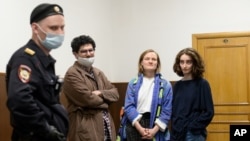Russian authorities on Wednesday charged four editors of an online student magazine with encouraging minors to take part in illegal activity for a report about the nationwide protests supporting jailed opposition leader Alexey Navalny.
All four were ordered by a court not to leave their residences for the next two months and were banned from using the internet and communicating with anyone other than immediate family, lawyers and law-enforcement agencies.
The charges, which carry a potential sentence of three years in prison, come amid heightened pressure on independent news media.
Police raided the Moscow apartments of the four DOXA magazine editors as well as the apartments of two of the editors' parents and the magazine's offices before taking the editors in for questioning, according to DOXA and a human rights group involved in their defense.
DOXA said the actions were connected to a video the magazine ran about the protests calling for Navalny's freedom, which took place throughout the country on two consecutive weekends in January, among the largest shows of defiance in a decade.
The video talked about the pressure that school and university students faced before the protests and described threats of expulsion, which it said were unlawful, for participating in the demonstrations.
Russia's media and internet watchdog Roskomnadzor demanded that DOXA delete the video. The magazine complied, but filed a lawsuit contesting the order.
DOXA said Wednesday that the video contained "no calls for unlawful actions — we were saying that young people shouldn't be afraid to express their opinion."
"The pressure the journalist community has faced recently is unprecedented, but we won't stop our work. We will continue to cover what's important for young people and will continue to stand up for their rights," the magazine's statement read.
Navalny's chief strategist, Leonid Volkov, faces similar charges, although he left Russia in 2019. On Wednesday, he expressed "unconditional respect and support" on Facebook for the four DOXA editors: Armen Aramyan, Natalya Tyshkevich, Vladimir Metelkin and Alla Gutnikova.
As the four appeared one-by-one in front a judge on Wednesday evening, dozens of supporters gathered near the courthouse in central Moscow. Some carried banners saying "We are DOXA" and "Get your hands away from DOXA."
Navalny, who is President Vladimir Putin's most visible foe, was arrested on Jan. 17 upon returning to Russia from Germany, where he had spent five months recovering from nerve-agent poisoning that he blames on the Kremlin. He was later sentenced to about 2 1/2 years in prison on the grounds that his long stay in Germany violated terms of a suspended sentence on a previous conviction for financial misdeeds.
The crackdown on DOXA came several days after police searched the apartment of a prominent investigative journalist, Roman Anin, chief editor of the Vazhniye Istorii website. The website said the raid was likely linked with a 2016 story Anin wrote for the independent newspaper Novaya Gazeta that alleged a lavish super-yacht belonged to Igor Sechin, head of Russian state oil company Rosneft.
Novaya Gazeta was ordered to retract the story as a result of a civil court case, but a criminal case on the matter has been pending for years.
"Coverage of some important issues — protests, corruption, and so on — is perceived as hostile criminal activity, so none of the journalists who honestly do their job can feel safe now," said Damir Gainutdinov of the Agora human rights organization that is providing legal support to three of the DOXA editors.




